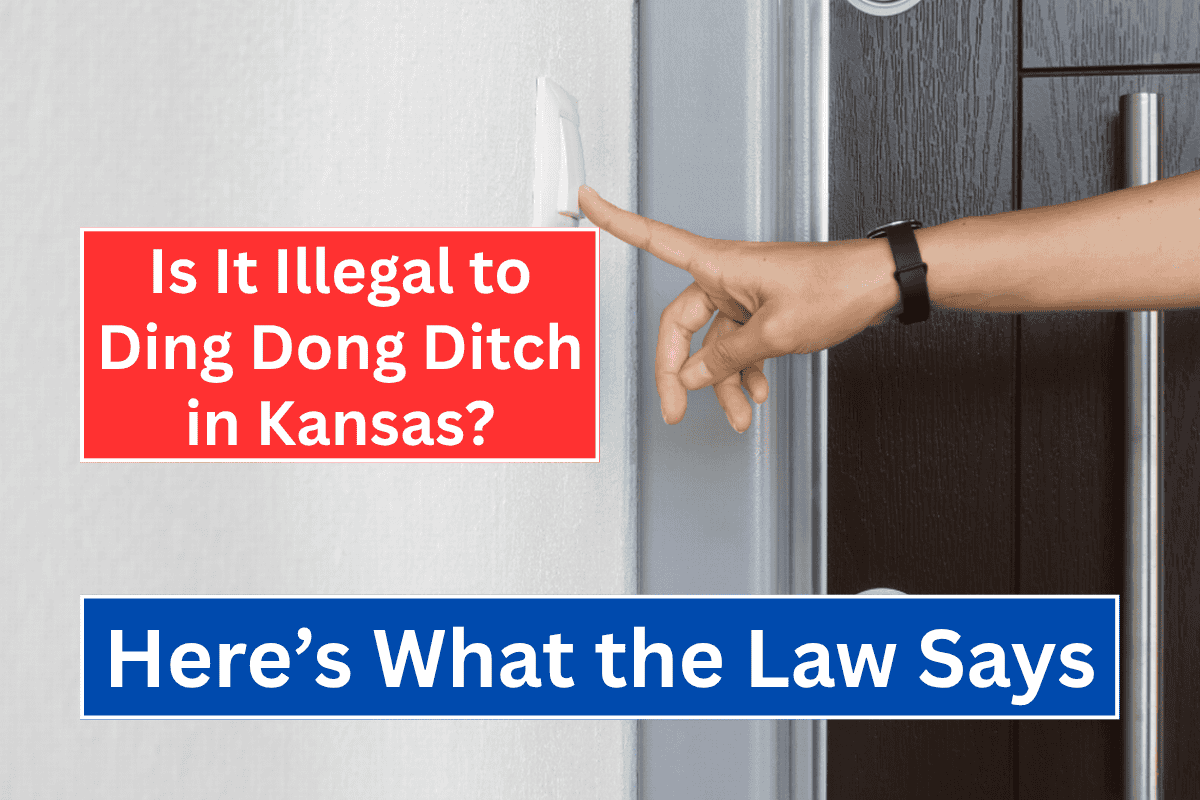Ding dong ditch, a prank where someone rings a doorbell and runs away before the homeowner answers, is often considered harmless fun. However, in Kansas, like many other states, this prank can lead to legal consequences, depending on the situation.
While it might seem like a small joke, it can become serious if it involves repeated actions, causes distress, or damages property. Let’s break down the legal implications and what you should know about the law in Kansas regarding ding dong ditching.
The Legal Definitions: Trespassing, Harassment, and Disorderly Conduct
Ding dong ditching may fall under several legal categories, including trespassing, harassment, and disorderly conduct. Understanding these terms will help you see why this prank can lead to serious legal trouble.
1. Trespassing
Trespassing laws are designed to prevent people from entering private property without permission. In Kansas, even briefly stepping onto someone’s property to ring their doorbell can be considered trespassing.
If the property is marked with a “No Trespassing” sign or if the homeowner has explicitly asked someone not to come onto their property, ding dong ditching could lead to a trespassing charge.
2. Harassment
When ding dong ditching becomes repetitive or is specifically targeted at one person, it can escalate into harassment. Harassment laws protect individuals from unwanted behavior that causes distress or fear.
If the prank is perceived as part of a pattern of behavior meant to intimidate or annoy the homeowner, it could lead to harassment charges.
3. Disorderly Conduct
Disorderly conduct laws apply to behavior that disturbs the peace or causes public disruption. Ding dong ditching can be considered disorderly conduct, especially if it is done frequently or disturbs a neighborhood. Penalties for disorderly conduct can include fines, community service, or, in severe cases, jail time.
Legal Consequences of Ding Dong Ditching
Although it’s often seen as a harmless prank, ding dong ditching can result in several legal consequences, especially if it becomes a repeated behavior or causes issues. Here are the potential penalties:
1. Fines
Ding dong ditching is typically classified as a misdemeanor, and fines are one of the most common consequences. In Kansas, fines for trespassing or disorderly conduct can range from $50 to several hundred dollars, depending on the severity of the offense.
2. Community Service
In some cases, individuals who are caught ding dong ditching may be required to complete community service, especially if they are minors or first-time offenders. This can be part of a sentence or a way to make amends for their actions.
3. Criminal Record
Ding dong ditching could result in a criminal record, especially if the behavior is repeated or escalates. For minors, this might involve juvenile charges, but adults can face misdemeanor charges that could impact their future, including employment and education opportunities.
4. Restitution
If the prank results in property damage—whether from knocking on doors too aggressively or disturbing something else on the property—the individual responsible may be required to pay restitution to the homeowner to cover the cost of repairs.
5. Arrest
In rare cases, especially if ding dong ditching escalates or leads to significant emotional distress, property damage, or breaking and entering, an arrest could occur. Although this is not common, severe cases could lead to jail time.
Ding Dong Ditch and Minors
Many of the individuals involved in ding dong ditching are minors. Laws regarding juvenile offenses can be different from those for adults, and minors may face different consequences. Here are some important points to consider:
1. Parental Responsibility
In Kansas, parents may be held responsible for their child’s actions if the prank leads to property damage or emotional harm. This could result in legal actions against parents, including fines or other penalties.
2. Juvenile Charges
Minors caught ding dong ditching might face charges within the juvenile justice system. Penalties could include warnings, probation, community service, or other corrective measures, depending on the severity of the incident.
3. School Consequences
If the prank occurs on school grounds or violates school policies, schools may take disciplinary action. This could include detention or other punishments, depending on the school’s rules.
How to Avoid Legal Trouble
To avoid the legal consequences of ding dong ditching, it’s essential to understand that what may seem like harmless fun can sometimes lead to serious issues. Here are some tips to avoid trouble:
1. Understand Local Laws
Each state and municipality may have different laws regarding trespassing, harassment, and disorderly conduct. Make sure you’re aware of local regulations before engaging in pranks like ding dong ditching.
2. Respect Privacy
It’s important to respect other people’s privacy and property. If you plan to prank someone, ensure that it doesn’t violate their personal space or cause them any distress.
3. Educate Minors
If you’re a parent or guardian, it’s crucial to educate minors about the potential consequences of ding dong ditching. Encouraging respectful behavior can help prevent legal problems in the future.
While ding dong ditching may seem like a harmless prank in Kansas, it can lead to serious legal consequences depending on the circumstances. It can result in charges like trespassing, harassment, or disorderly conduct, which could carry fines, community service, or even jail time.
To stay out of trouble, it’s important to be aware of local laws and respect others’ privacy. What might seem like a small joke can end up having significant legal repercussions.












